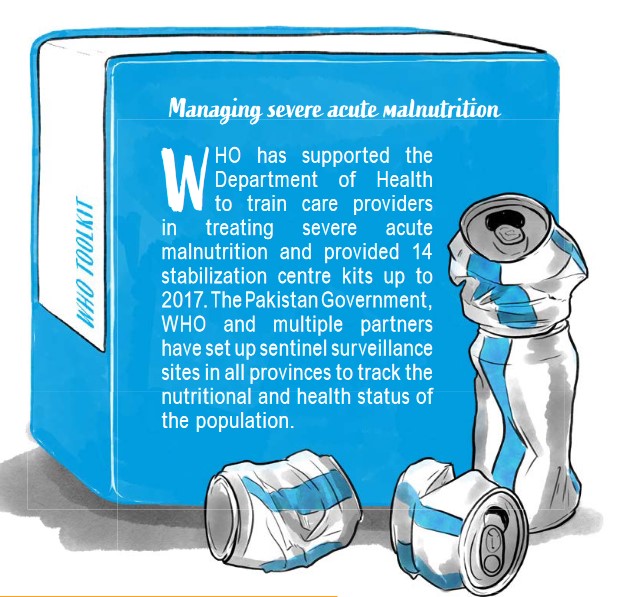World Health Organization
The COVID-19 pandemic and mental health: Arsha’s story - Pakistan
19 Nov 2021
World Health Organization. Regional Office for the Eastern Mediterranean | 28 Aug 2023
Pakistan carried out a noncommunicable disease (NCD) risk-factor surveillance (STEPS) survey in 2013. The Government has used the results to develop a range of evidence-based policies and establish a Noncommunicable Diseases Unit at federal level. Pakistan has taken a multisectoral approach, prioritizing malnutrition and mental health problems early in life, to give people better chances for the future and reduce the likelihood of NCD burdens in later life.
Pakistan launched Umang in 2018 - its first 24/7 mental health helpline. It offers support while actively breaking down the stigma surrounding mental health.
SHINE - Pakistan is collaborating with Egypt, the Islamic Republic of Iran and Jordan on a project investigating the scaling up of mental health services in schools.
Pakistan collaborated with UNICEF to carry out a national nutrition survey in 2018, to get a clear picture of the nutritional challenges facing the country.
In the light of the 2018 survey results, Pakistan has put in place a five-year nutrition strategy, which will take the country through to 2025, with a particular focus on combating malnutrition and stunting.
2019 – Pakistan launched Ehsaas, a multi- billion-Pakistani Rupee programme to eradicate poverty, which also supported Pakistan’s poorest people during the pandemic.
2020 – the Government created the Adolescent Nutrition Supplementation Guidelines to ensure that proper nutritional standards were met for young people through to adulthood.
The Government of Pakistan is tackling the challenges of malnutrition and stunting through its Multisectoral Nutrition Strategy for 2018 – 2025. Regional work is being overseen by national advisory bodies including the National Nutrition Working Group, Technical Working Group for Community Management of Acute Malnutrition, Technical Advisory Group for Infant and Young Child Feeding, and an Early Childhood Task Force.
At the same time, Pakistan has launched its biggest poverty eradication programme – Ehsaas. With funding of over 80 billion Pakistani Rupees for nutrition-sensitive and nutrition-specific programmes, Ehsaas aims to change the lives of millions of Pakistan’s poorest people. During the COVID-19 pandemic, the Ehsaas Emergency Cash Programme has been a lifeline to 13.2 million people, giving lower-income families a monthly stipend to help them through.
 In 2018, the Government of Pakistan and UNICEF carried out a national nutrition survey which included children, women of reproductive age and adolescent boys and girls. The survey assessed nutritional status and evaluated important factors affecting nutrition, including infant and young child feeding practices, household food insecurity and implementation of universal salt iodization.
In 2018, the Government of Pakistan and UNICEF carried out a national nutrition survey which included children, women of reproductive age and adolescent boys and girls. The survey assessed nutritional status and evaluated important factors affecting nutrition, including infant and young child feeding practices, household food insecurity and implementation of universal salt iodization.
The results highlighted the increasing prevalence of the double burden of malnutrition. They showed that almost one in three children under five are underweight, while the percentage of overweight children in the same age group was 9.5% – a figure that has almost doubled between 2011 and 2018.
This research helped to inform Pakistan’s 2020 launch of the Adolescent Nutrition Supplementation Guidelines. These give a series of recommendations to improve adolescent nutrition, from lifestyle guidance around healthy eating and physical activity, to prohibiting the sale of unhealthy drinks and snacks in schools. The guidelines also include standards for screening adolescents in schools, health facilities and in the community to identify and help at-risk adolescents, as well as including nutrition standards for school meals. There are also recommendations of daily iron and folic acid supplements for non-pregnant married women, with micronutrient tablets and counselling on healthy diet provided for those who are underweight. These actions ensure the health of women and reduce the likelihood of babies being born with spina bifida.
Umang is Pakistan’s first 24/7 mental health helpline. In 2018, a group of physicians created this free service, funded by Ferozsons Pakistan, to address the gap between the increase in reported mental health conditions and the lack of accessible mental health services. The helpline is run by a team of 200 clinical psychologists, therapists, counsellors and psychiatrists, all of whom are Good Clinical Practice certified. To date, the team has provided over 5000 therapeutic sessions, completed over 7000 consulting hours and has reached out to more than 10 000 individuals. Most traffic comes from Google, Facebook and Instagram. Umang is also actively working to break down taboos and stigma surrounding mental health conditions.
SHINE is the School Health Implementation Network: Eastern Mediterranean Region. It is a collaborative research project between Egypt, the Islamic Republic of Iran, Jordan and Pakistan, aiming to address the challenges of scaling up school- based mental health services. Ten to twenty per cent of children are affected by socio-emotional problems globally, with the heaviest burden in low- and middle-income countries.
Evidence suggests that school-based interventions, which assess child mental health across whole schools and also target individuals most in need, can help children thrive socially, emotionally and academically. Researchers have been conducting the implementation study in rural Rawalpindi, Pakistan, adapting WHO’s School Mental Health Programme manual into an algorithm-based chatbot to help teachers identify and manage low-intensity mental health problems in their students. Egypt, Islamic Republic of Iran and Jordan are pushing forward with capacity-building activities based on the shared results of the implementation study. The hope is that this cross-disciplinary and cross-sectoral collaborative network will help children in the Region to get the mental health support they need.
This country story is part of a series on sharing successful strategies from the Eastern Mediterranean Region mitigating noncommunicable diseases and mental health disorders during the COVID-19 pandemic and beyond. Discover additional stories and insights in the full report published by the World Health Organization Regional Office for the Eastern Mediterranean.